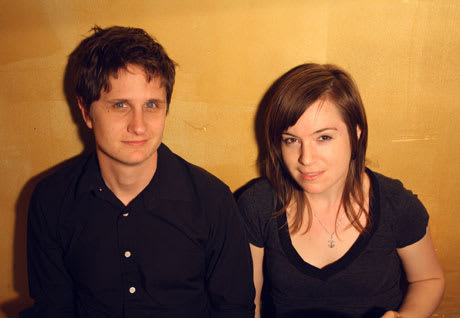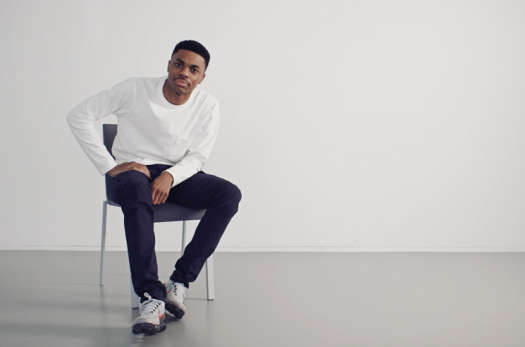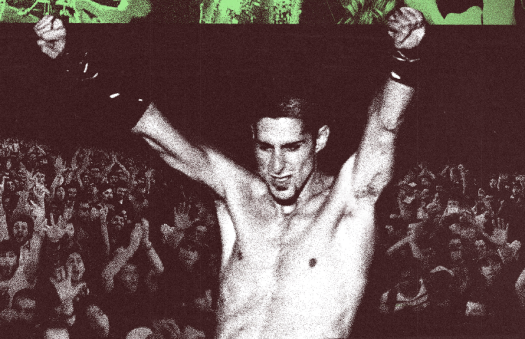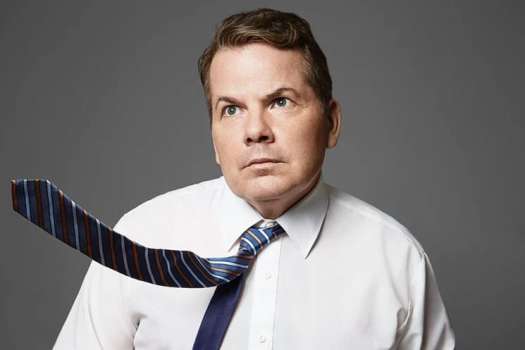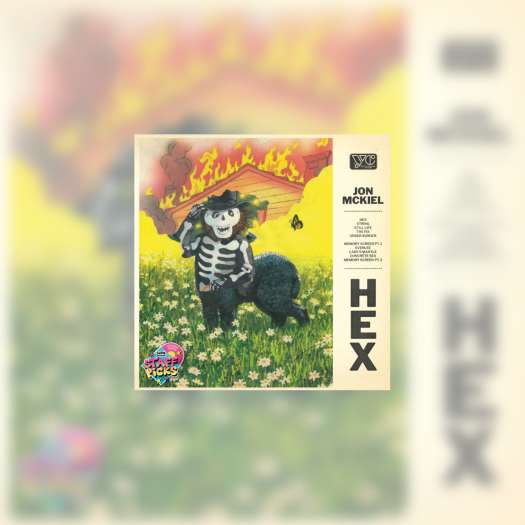Berkeley, CA DIY duo Street Eaters have evolved in compelling ways since their 2009 EP, We See Monsters, maintaining an overall joyous sound while committing more confidently to the principles of community and the political sociology that inform not only their music but their being. With John No (formerly Johnny Geek) on bass and Megan March on drums, with both handling vocals, the fundamental sound of the band remains the same ― nervy, hooky, lo-fi indie punk ― but there's songwriting maturity in opener "Heavy Into Nothing" and darkness in "Nation Builder" that are both young-angry and surprisingly powerful. "Waiting" is the band at their fuzzed-out, straightforward best, aligning them more closely with UK post-punk acts like Wire than the '90s radio-punk kingpins that came out of the same East Bay scene. However, closer "No Time" sounds like a field-recording send-up, an evocative, chilling symbolic dirge that, just in case you missed it on the first round, makes you realize there's much more to this simple two-piece than at first meets the eye.
Tell me a bit about how you guys got together. You were both involved in the DIY scene in Berkeley, right?
Drummer/vocalist Megan March: True. We both grew up in the Bay Area and went to [924] Gilman [Street] a lot [an all-ages, DIY music/art venue]. We were both volunteers there, and both of our bands played there, so we've kind of just known each other for a really long time. Being in the same scene, playing music, you know the same community and circle of friends.
Bassist/vocalist John No: We both have always had a pretty broad view of people who are involved around music, at least in the communities we're in. They play music but also do other things like book shows, do sound and work for different DIY organizations that kind of help make music happen.
Do you guys still have time to be involved with those things?
Megan: We do as much as we can, but we have been out of town a lot, especially during the summer. I think helping out your community takes on different roles when you're doing different stuff. Since we're touring so much, we're meeting a lot of other musicians from different places and they tour. We help them figure out booking shows and stuff like that when we can, even when we're on tour sometimes.
Do you find a similar approach or mindset from the people drawn to your band or the ones who reach out to you?
Megan: I would like to think so. A lot of the people that we've talked to are on the same sort of wavelength, even down to what we write our songs about, and musically, there's community. It's interesting because the tour that we're taking right now, the route has been a lot of different towns that I haven't necessarily played in, but John has with other bands, and a lot of the other people in bands that we're playing with I've actually met from playing other shows either in the Bay Area or on other tours. It's interesting to see how the music scene can be because people are constantly touring and travelling.
Do you find that it's limiting at all?
John: That's actually a really good question. It can be limiting sometimes because there is insularity involved in the community that we're involved in, from time to time. It happens because often times, or periodically, things will blow up or things will get more popular than they were expected to and people will get a little bit confused and it's complicated. But the truth is that we really do enjoy it and we don't feel particularly limited by it at all. It's kind of nice that people will talk to us about these things. They're curious about our approach to playing music and how we do stuff. They ask about our merch, like, "wow, you guys have all these T-shirts, handmade…"
Megan: We hope we can inspire people to be able to do things themselves and not feel like they have to be limited by having to do things professionally. We screen all our shirts ourselves and make all the screens. It's kind of a funny story, but we didn't get our LPs for the new record in time for the tour, so we ended up ordering 50 test presses of the new record and that meant that we had to order 50 blank LP sleeves from a different company. And then a day before we left for tour, I had to make a screen for the covers, and I hand-screened all the covers. I ended up getting blisters on my hands; I don't get blisters from playing drums anymore, but I got blisters from screening all these shirts and all these records. But it ended up being really cool because the pressure sort of forced us to come up with some amazing art last minute. And people loved it! Not all of them turned out all that great ― you know, some were a little smudgy. But it was a limited tour edition out of 50, and it ended up being a fun thing. We sold all of them. Hopefully we'll get enough of the actual records for our record release, but we were pretty inspired by the fact that they all flew out.
John: We're on two great record labels run by good friends of ours, and the thing about it is that these are, again, DIY labels, to an extent. These are individuals running these labels. Plan-It-X has a crew of people who also work on staff, but, really, it isn't like the standard record label where you just hand them something and they hand you something back. We're involved in every step of the process. It's all very hands on for all parties all the time; it's a community-based kind of thing.
Does that include the recording process for the new album? Tell me a bit about making this record.
John: We have a really good engineer and producer guy named Matt Waters, who's a good friend of ours, and he does most of our recordings. He did most of the recording on the record over a few different sessions. And we were also fortunate to do three of the songs at Women's Audio Mission in San Francisco, which is a really great non-profit that encourages young women to become sound engineers.
Megan: A friend of mine is an intern there and she showed some live footage of us playing to Terri Winston, who's sort of the head coordinator at WAM. Terri liked our music and invited us to come and record. It's really cool because it's a non-profit and what they do is they get grants; I think ours was from the California Arts Council. We really like their approach to everything because they're so community-oriented and their whole mission is to try to get women involved with recording. For us, it was a real treat to work in a nice studio with really nice equipment, but also to work with an entirely female sound team. It gave us a lot of cool perspective. That whole experience was really powerful, and we did one song that I actually recorded, one of the extra tracks that's on the CD only. It was an a cappella song that I wrote that was sort of a one-off special thing that we did just to have an extra track on the CD.
Megan, do you find that you're a role model to young women in the punk community?
Megan: I know that I've found a lot of really powerful role models in the DIY scene, especially with women in the Bay Area, and it really means a lot to me when women older or younger than me say how awesome it was for them to see a lady playing drums. I think that the term "role model" might be someone being younger looking up to someone older, but I actually find that I'm inspired by a lot of younger people too, and older people. People who give me feedback saying that they really enjoy my drumming come from all different age groups too. I guess I'd like to redefine "role model" [laughs]. But, yeah, I hope. I mean, the more women that are playing music, the better off the world is. I feel so inspired by my friends too, who are making music and are also involved in music in different ways, like interviewing, taking pictures, writing zines or making album artwork. There are so many ways that people can be involved.
Sorry, John, we're just trying to help tip the scales here.
Megan: [laughs] John's all for it!
John: Megan is a pretty fierce force and a talented drummer; I admire her. If anything, she's kind of one of my role models. It's kind of funny when we go to places where we're playing for people who maybe aren't as used to seeing women musicians in general. There are a lot of men who aren't used to seeing that and they sometimes don't really know how to handle that. They'll say, "you play so great for a lady," and it'll kind of give us an opportunity to be like, "yeah, women can play just as well as men."
Megan: And a lot of ladies saying they wish they could play too. It's like, "why don't you? There's no reason why you can't!" Speaking of role models, I always think of the drummer in Babes in Toyland [Lori Barbero], who learned to play in her late 20s or something. It's never too late, you know? And it's never too early. So many people at shows say they live with their parents and can't learn drums, but, you know, when you turn 18... Life is long and you can learn how to do anything you want.
(Plan-It-X)Tell me a bit about how you guys got together. You were both involved in the DIY scene in Berkeley, right?
Drummer/vocalist Megan March: True. We both grew up in the Bay Area and went to [924] Gilman [Street] a lot [an all-ages, DIY music/art venue]. We were both volunteers there, and both of our bands played there, so we've kind of just known each other for a really long time. Being in the same scene, playing music, you know the same community and circle of friends.
Bassist/vocalist John No: We both have always had a pretty broad view of people who are involved around music, at least in the communities we're in. They play music but also do other things like book shows, do sound and work for different DIY organizations that kind of help make music happen.
Do you guys still have time to be involved with those things?
Megan: We do as much as we can, but we have been out of town a lot, especially during the summer. I think helping out your community takes on different roles when you're doing different stuff. Since we're touring so much, we're meeting a lot of other musicians from different places and they tour. We help them figure out booking shows and stuff like that when we can, even when we're on tour sometimes.
Do you find a similar approach or mindset from the people drawn to your band or the ones who reach out to you?
Megan: I would like to think so. A lot of the people that we've talked to are on the same sort of wavelength, even down to what we write our songs about, and musically, there's community. It's interesting because the tour that we're taking right now, the route has been a lot of different towns that I haven't necessarily played in, but John has with other bands, and a lot of the other people in bands that we're playing with I've actually met from playing other shows either in the Bay Area or on other tours. It's interesting to see how the music scene can be because people are constantly touring and travelling.
Do you find that it's limiting at all?
John: That's actually a really good question. It can be limiting sometimes because there is insularity involved in the community that we're involved in, from time to time. It happens because often times, or periodically, things will blow up or things will get more popular than they were expected to and people will get a little bit confused and it's complicated. But the truth is that we really do enjoy it and we don't feel particularly limited by it at all. It's kind of nice that people will talk to us about these things. They're curious about our approach to playing music and how we do stuff. They ask about our merch, like, "wow, you guys have all these T-shirts, handmade…"
Megan: We hope we can inspire people to be able to do things themselves and not feel like they have to be limited by having to do things professionally. We screen all our shirts ourselves and make all the screens. It's kind of a funny story, but we didn't get our LPs for the new record in time for the tour, so we ended up ordering 50 test presses of the new record and that meant that we had to order 50 blank LP sleeves from a different company. And then a day before we left for tour, I had to make a screen for the covers, and I hand-screened all the covers. I ended up getting blisters on my hands; I don't get blisters from playing drums anymore, but I got blisters from screening all these shirts and all these records. But it ended up being really cool because the pressure sort of forced us to come up with some amazing art last minute. And people loved it! Not all of them turned out all that great ― you know, some were a little smudgy. But it was a limited tour edition out of 50, and it ended up being a fun thing. We sold all of them. Hopefully we'll get enough of the actual records for our record release, but we were pretty inspired by the fact that they all flew out.
John: We're on two great record labels run by good friends of ours, and the thing about it is that these are, again, DIY labels, to an extent. These are individuals running these labels. Plan-It-X has a crew of people who also work on staff, but, really, it isn't like the standard record label where you just hand them something and they hand you something back. We're involved in every step of the process. It's all very hands on for all parties all the time; it's a community-based kind of thing.
Does that include the recording process for the new album? Tell me a bit about making this record.
John: We have a really good engineer and producer guy named Matt Waters, who's a good friend of ours, and he does most of our recordings. He did most of the recording on the record over a few different sessions. And we were also fortunate to do three of the songs at Women's Audio Mission in San Francisco, which is a really great non-profit that encourages young women to become sound engineers.
Megan: A friend of mine is an intern there and she showed some live footage of us playing to Terri Winston, who's sort of the head coordinator at WAM. Terri liked our music and invited us to come and record. It's really cool because it's a non-profit and what they do is they get grants; I think ours was from the California Arts Council. We really like their approach to everything because they're so community-oriented and their whole mission is to try to get women involved with recording. For us, it was a real treat to work in a nice studio with really nice equipment, but also to work with an entirely female sound team. It gave us a lot of cool perspective. That whole experience was really powerful, and we did one song that I actually recorded, one of the extra tracks that's on the CD only. It was an a cappella song that I wrote that was sort of a one-off special thing that we did just to have an extra track on the CD.
Megan, do you find that you're a role model to young women in the punk community?
Megan: I know that I've found a lot of really powerful role models in the DIY scene, especially with women in the Bay Area, and it really means a lot to me when women older or younger than me say how awesome it was for them to see a lady playing drums. I think that the term "role model" might be someone being younger looking up to someone older, but I actually find that I'm inspired by a lot of younger people too, and older people. People who give me feedback saying that they really enjoy my drumming come from all different age groups too. I guess I'd like to redefine "role model" [laughs]. But, yeah, I hope. I mean, the more women that are playing music, the better off the world is. I feel so inspired by my friends too, who are making music and are also involved in music in different ways, like interviewing, taking pictures, writing zines or making album artwork. There are so many ways that people can be involved.
Sorry, John, we're just trying to help tip the scales here.
Megan: [laughs] John's all for it!
John: Megan is a pretty fierce force and a talented drummer; I admire her. If anything, she's kind of one of my role models. It's kind of funny when we go to places where we're playing for people who maybe aren't as used to seeing women musicians in general. There are a lot of men who aren't used to seeing that and they sometimes don't really know how to handle that. They'll say, "you play so great for a lady," and it'll kind of give us an opportunity to be like, "yeah, women can play just as well as men."
Megan: And a lot of ladies saying they wish they could play too. It's like, "why don't you? There's no reason why you can't!" Speaking of role models, I always think of the drummer in Babes in Toyland [Lori Barbero], who learned to play in her late 20s or something. It's never too late, you know? And it's never too early. So many people at shows say they live with their parents and can't learn drums, but, you know, when you turn 18... Life is long and you can learn how to do anything you want.
